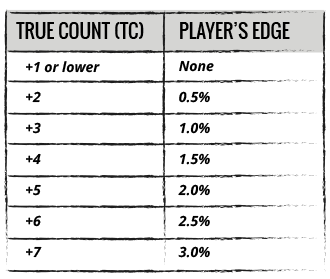Card Counting Tips


By There is no such thing as a “best” Obviously, the answer to this question is not as easy as it appears. Several approaches have been used in the past to evaluate card counting systems. One analytical approach is the calculation of several performance parameters (e.g., playing, betting, and insurance efficiencies). The results are then used to approximate the potential of one system over another. Another approach that is used is to simulate each system against typical game conditions on a high speed computer. Simulations can provide an accurate real-world estimate of the advantages and win-rates that are possible in playing a particular system.
However, the problem with coming up with a ‘best’ card counting system. Instead of a single-level ‘unbalanced’ count you could assign more accurate point values to each card and determine true counts by the exact number of decks or cards remaining. You could improve ‘playing’ efficiency by assigning a ‘zero’ to the Ace and side counting each of them. You could also side count other cards such as 7s, 8s, and 9s thus improving your play against specific hands. You could also incorporate play variations (changes to basic strategy) based on specific counts by remembering ‘every’ index number for ‘every’ play possible. To improve the accuracy of your insurance decisions you could also keep a separate count of all the tens in the deck or shoe. Of course, you don’t want to forget all the ‘practical’ advice each system offers in regard to betting, playing, camouflage, and other tips and tricks of the trade.
Make lifestyle choices to improve mental focus. The player must not only count the cards dealt to. When you first begin to practice card counting, use the “Single Deck” mode, set the “Speed” to “Slow,” and select 10 or 15 seconds as the amount of time you’ll have to stop the drill and key in your count. Gambling author and blackjack expert Henry Tamburin answers some of the most common questions that players have about card counting in blackjack. In order for card counting to give you an edge, you need something known as deck penetration. That means dealing deep into the deck. The deeper the deal goes, the more accurate your count becomes. Notice that we did not say card counting online was worthless. Counting Cards in Blackjack Running Count and True Count. Keeping a track of the numbers of cards that have been dealt is what is commercially known. Strategies Used. As mentioned, as the number of the card values dealt gets higher, the player knows there are more high. Advanced Strategies.

I believe the above comment was one of the most important suggestions ever made about card counting. Griffin suggested that it may be better to keep your base count simple to allow your brain the ability to perform other tasks and to utilize other sources of information. These other sources of information can often improve the potential of a single-level count over an advanced 2- or 3-level count that doesn’t use this information. This information includes side counts, shuffle tracking, ace location strategies, key card techniques, and dealer errors. My own experience at card counting has shown that Griffin was probably right.

Human error is another reason to keep it simple. The most advanced card counting system may be one that perfectly balances theoretical power and your human ability to execute it accurately.

ADDITIONAL RESEARCH
Blackjack Card Counting Tips
- The”Best” Card Counting System: A Comparison of the Top 100 by Copyright © 1994 – 2020 All Rights Reserved
FAQ 11: Originally published in Volume 6 Issue 4 of Blackjack Review Magazine
RETURN NEXT FAQ↑1 A single-level count assigns point values in such a manner that the non-zero point values are the same in absolute value, namely +1 or -1. The single-level Hi-Lo count, for example, assigns 2 – 6 as +1, 7 – 9 as 0, and Tens and Aces as -1.